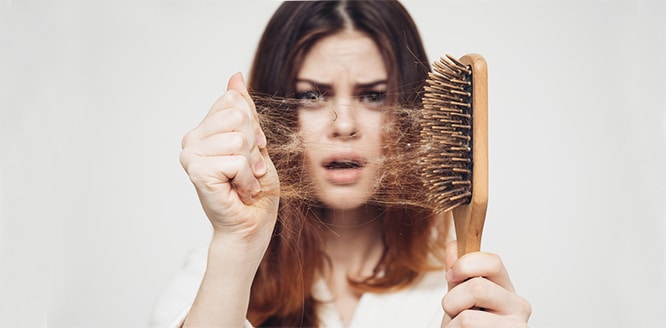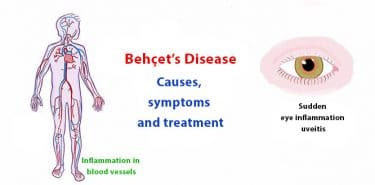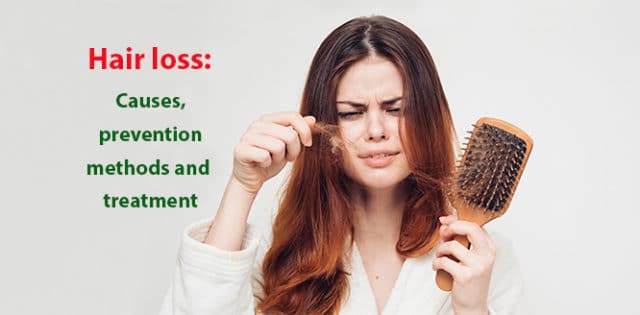 Hair loss is a common problem in adults, however, can also occur in children. It can be permanent or temporary and can develop gradually over time or happen suddenly. Usually, an adult has approximately 100.000 to 150.000 hairs and lose almost 100 hairs a day. This loss is normal; however, if you observe more hair loss, you should consult a dermatologist to determine its cause, because sometimes it can be a symptom of a serious health problem. Seasonal changes, stress, iron deficiency and hormonal disorders can cause sudden hair loss. It can be treated with medication, mesotherapy, PRP method or hair transplantation. In addition, there are many herbal cures that prevent it.
Hair loss is a common problem in adults, however, can also occur in children. It can be permanent or temporary and can develop gradually over time or happen suddenly. Usually, an adult has approximately 100.000 to 150.000 hairs and lose almost 100 hairs a day. This loss is normal; however, if you observe more hair loss, you should consult a dermatologist to determine its cause, because sometimes it can be a symptom of a serious health problem. Seasonal changes, stress, iron deficiency and hormonal disorders can cause sudden hair loss. It can be treated with medication, mesotherapy, PRP method or hair transplantation. In addition, there are many herbal cures that prevent it.
Table of Contents
What is hair loss?
Hair loss is excessive loss of hair due to various reasons such as seasonal changes, stress, anxiety, iron deficiency and hormonal problems. Hair is formed by keratin protein produced by hair follicles on the outer layer of the skin and old hair cells fall as new cells are generated by the follicles. Male-pattern hair loss is generally permanent and often genetic.
It is normal to lose 50 to 100 hair strands a day, however, if this number increases, this is a problem. In case the person has sudden hair loss, itchiness and burn on the head, losing hair in clumps and develop bald patches, then a doctor must be consulted to stop and prevent this condition. It may also indicate a serious health problem.
Causes of hair loss
Physical trauma
Any kind of physical trauma, surgery, car accident, a serious disease, or even a temporary flu can cause hair loss. It is generally noticed three to six months after the trauma. Good news is your hair will start growing back as your body recovers.
Pregnancy
Pregnancy related hair loss is generally seen after the birth instead of the pregnancy period. Giving birth is a very traumatic experience. But do not worry; your hair will recover within a few months.
Excessive vitamin A
Using supplements or drugs containing vitamin A more than required can trigger hair loss. It will stop once the vitamin A levels are balanced.
Protein deficiency
If you nutritional habits lack sufficient protein, your body can chose to stop hair growth and distribute protein elsewhere. And this will prevent new hair from growing. There are many major protein sources including fish, meat and egg.
Male-pattern baldness
Two thirds of men suffer from this problem before the age of sixty. This type of baldness is caused by the combination of genes and male hormones and generally follows a traditional pattern where hair is only left on temporal sides with an M-shaped hairline. Topical creams like minoxidil and oral medication like finasteride (Propecia) that can stop it and even let some of them grow back can be used. Hair transplant operation is also another option.
Genetic factors
Genetics, one of the most important reasons of hair loss, are a common cause for both women and men.
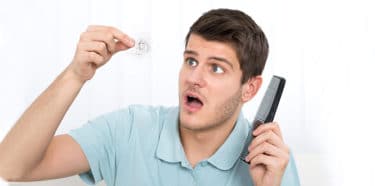
Hormonal problems
Conditions like pregnancy, termination of contraceptive pills and menopause, which cause hormonal changes, can trigger this problem. A blood test on the second or third day of menstruation can determine if this is due to a hormonal problem.
Stress and depression
Psychological problems like depression, tension and anxiety are important causes of hair loss.
Malnutrition
Poor nutritional habits are another important cause. In order to prevent hair loss caused by single-type nutrition rich in carbohydrates, a regular and balanced diet is required to feed hair follicles, which are consisted of living cells. It can occur due to vitamin and mineral deficiency in people with restricted vitamin B12, vitamin D, folic acid, zinc, biotin and iron intake. It can be prevented by quickly adopting a healthy diet rich in vitamins and minerals.
Certain skin diseases
Development of certain skin diseases like psoriasis, eczema, acne, lichen planus on the scalp can lead to hair loss as well. In that case it can be prevented with the treatment of underlying disease.
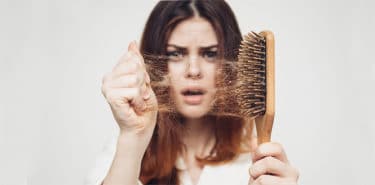
Use of certain medication
Contraceptive pills, drugs used for the treatment of thyroid gland disease, medications for adrenal glands, hypertension, depression and heart can cause it.
Certain diseases
Thyroid gland diseases, rheumatic diseases, insulin resistance, diabetes, adrenal gland disease, lichen planus, alopecia areata and anemia are the most important diseases that accelerate this problem.
Chemotherapy
Some drugs used during chemotherapy, which is a mandatory treatment for most cancer patients, can lay the foundation for hair loss. Hair will grow back after chemotherapy is ended; however, hair may have a different pattern (curly when straight) or color.
Wrong hair care applications
Hair dyes applied to bleach the hair color, hair straighteners and hair dryers are very inaccurate hair care applications that accelerate it. Hair can recover by avoiding these methods.
Polycystic ovarian syndrome
Polycystic ovarian syndrome (PCOS) is another hormonal imbalance in women and men. Androgen surplus can causes ovarian cysts, weight gain, higher diabetes risk, changes in menstrual cycle, infertility and hair thinning.
Treatment of hair loss
Doctors can diagnose the cause of problem after physical examination and extensive assessment of your medical background. Dermatologist may require skin biopsy in case of a suspected skin disease or autoimmune disease. Laboratory testing will reveal the underlying cause of it. And you can receive a suitable treatment planned according to the root cause.
Many types of hair loss can be treated. However, some types may require hair transplantation.
Medication
Medication, often preferred for the treatment of mild and moderate hair loss, helps increasing number of hairs, thickening of thin hair and preventing hair loss. Drugs are ineffective for growing hair back in case of baldness. Generally topical creams and gels are used for medication.
Mesotherapy
Mesotherapy, one of the most common treatment methods for hair loss, is the injection of vitamin, mineral and antioxidant directly into the scalp. Then the scalp is massaged. Mesotherapy generally lasts 5-10 sessions with five days of interval and helps growing healthy and strong hairs in addition to stopping hair loss. Mesotherapy is a pain-free application and can be performed both men and women.
Hair transplantation
Hair transplantation method is mostly preferred for male-pattern hair loss and baldness and it is the most definitive and permanent treatment method. People can have their old lively, strong and bright hair with hair transplantation.
PRP hair therapy
In PRP hair therapy, which provides very good results when applied in combination with mesotherapy, blood of the patient is collected, processed and injected to the hair loss region. This method is especially effective for the treatment on genetic hair loss.
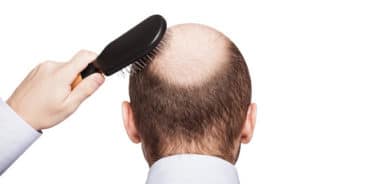
Hair loss in men
Increased DHT (dihydrotestosterone) levels, which is a very important hormone, in men due to age is the most important cause of male-pattern hair loss. Higher DHT levels leads to shortened hair growth phase, reduced hair number and severe hair loss.
Hair loss in women
Hair loss in women are generally seen in association with hormonal imbalances, pregnancy, menopause, birth, contraceptive pill use and a stressful lifestyle. Similarly, having hair highlighted, permed etc. also leads to easier and faster it by damaging hair strands.
Hair loss in children
It can occur in children due to many factors like vitamin B12 deficiency, goiter, anemia, zinc deficiency. Fungus spreading between children due to the use of same comb and hair ties can cause it. Alopecia in children is another important reason for it especially in patients with weak immune system.
In addition, hair pulling obsession, which is a psychological disorder, may lead to hair loss in children especially at times of stress. Certain immune system disorders like alopecia totalis, alopecia universalis are another cause that can also lead to the loss of other body hairs as well. Only a dermatologist can accurately diagnose the cause of it.
Hair loss in adolescents
Rapid hair loss in teenagers especially in their adolescence can be caused by stress. Future anxiety, concerns of profession selection, examination stress and similar negative psychological conditions, which especially start at adolescence, are among important causes of hair loss in teenagers. It can also occur in teenagers who start to develop irregular and imbalanced nutritional habits and choose fast food over homemade food.
In addition, insufficient vitamin, mineral and protein intake during diets applied in an attempt to look better and get thinner can also lead to hair loss. Wrong hair care habits like frequently going to hairstylist, having hair straightened or set for the sake of beautification is another cause of it observed in this period.
Hair loss after birth and its prevention
Regularly growing hair with increased oestrogen during pregnancy will only start falling 2-3 month after birth. Hair that was not lost during pregnancy will fall in clumps in that period. Stressful breastfeeding period, lack of sleep, anemia and irregular nutrition of the mother can also increase hair loss.
First remedy of this temporary problem is to use high quality hair care products, adopt a balanced diet and try to get enough sleep. And supplements prescribed by the doctor can also prevent hair loss to a certain extent.
Hair loss in nursing mothers generally stops after the sixth month and hair starts to get better. You should avoid using hair dryer at a high setting and don’t use chemical substances like hair dyes.
Hair loss in cancer patients
Chemotherapy, received by cancer patients, also causes hair loss. Certain drugs used during this period trigger hair loss in time. Patients’ hair will grow back after the chemotherapy is ended. Drugs attack cancerous cells and prevent them from spreading, however, these drugs also affect hair follicles and cause it.
Chemotherapy drugs not only cause hair loss but also eyebrows, eyelashes, body hair on armpits, arms, chest and legs can also be lost. Not every chemotherapy drug leads to hair loss. It is often triggered by anti-microtubule agents, toposiomerase inhibitors, alkylating agents and antimetabolites.
Hair loss generally starts between first and third weeks of chemotherapy. Almost all hair will be lost by the end of the third week. Eyebrows, eyelashes and other body hair will be lost in the coming months. Patients can have their healthy hair back within one year after the chemotherapy is completed.
How do I prevent hair loss?
- Adopt a regular and balanced diet. Nutritional habits containing excess amounts of carbohydrates, insufficient vitamin, mineral and protein intake, wrong and unhealthy diets are the most important causes of hair loss. You can stop it by adopting a diet involving protein based foods instead of excess carbohydrates and consuming nutrients rich in zinc, iron, copper, vitamins and minerals like B12.
- Avoid smoking and alcohol as much as possible.
- Stop fast-food habits.
- Try to sleep at least 8 hours a day regularly.
- Try to avoid stress.
- You may start meditation or yoga for relaxation.
- Consume plenty of folic acid-containing foods.
- Use shampoo and hair creams that are suitable for your hair type.
- Avoid getting frequent hairstyling like highlights, curling tongs and hair setting.
- Try preparing hair care cures at home.
What is good for hair loss? Herbal remedies
Aloe Vera
Aloe Vera balances the pH level of scalp and contains enzymes that enable healthy growth of hairs. Apply some Aloe Vera gel to get the benefits of this herb that alleviates itchiness and inflammation of the scalp. Wait for a few minutes, and then rinse your hair with warm water. You can repeat this 2-3 times a week.
Onion Juice
Onion juice has antibacterial properties, heals hair follicles and prevents development and spread of infections that cause hair loss. To stop it using onion juice, grate an onion and filter out its juice. Then apply that juice directly on to your scalp.
Wait for 30 minutes and then wash your hair with shampoo. You can repeat this method 2-3 times a week for a few weeks.
Fenugreek
Fenugreek helps your hair follicle to form back and also contains proteins that grow your hair. Keep a cup of fenugreek inside water overnight to benefit from its properties. Crush the seeds the next day. Rub your hair with the paste you obtained from the seeds. Wait for 40 minutes and then rinse your hair with warm water. You can repeat this every day for a month.
Beetroot extract
Beetroot exact, which is highly rich in protein, potassium, phosphor and calcium, is another herbal remedy that you can use for hair loss treatment. You can have healthier hair by adding fresh beetroot extract to your diet.
If you’d like you can boil a few beetroot leaves and mix that water with some henna until obtaining a paste; then you can rub this paste to your hair and rinse with warm water after 20 minutes. You can stop hair loss by repeating this process several times a week.
Flax Seed
Flax seed is a rich Omega 3 source and accelerates hair growth and prevents hair loss. You can consume flax seed by adding one spoon to your salads and soups or you may massage your hair using flax seed oil to prevent hair loss.
You can get rid of your hair problem by using these herbs that stop and prevent it. However, we strongly recommend you to consult your doctor before applying these. This will minimize your risk to encounter any side effects.
References: 1- Hair loss, 2-Hair Loss (Alopecia) and Cancer Treatment, 3- Patterned hair loss

